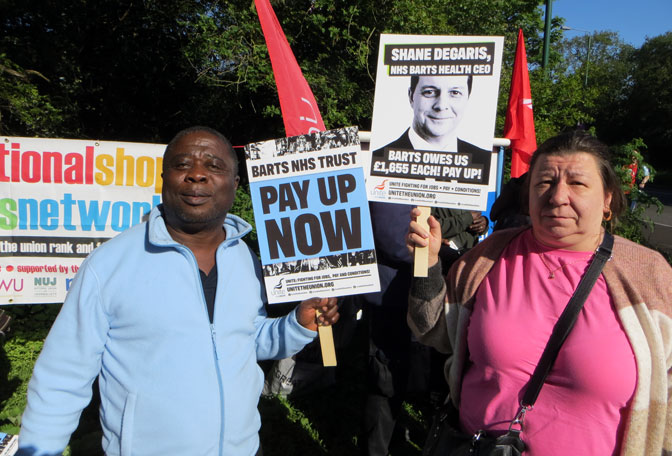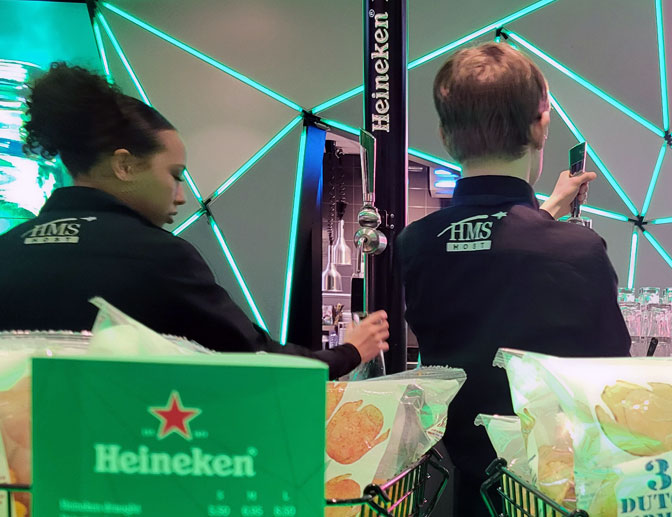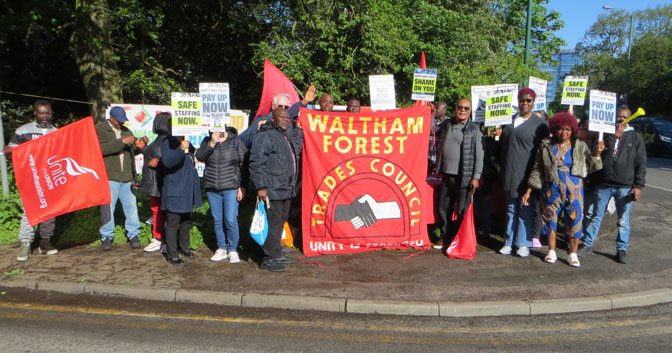
When, 50 years ago this year, a new Labour government took power, one of its first new laws was the Health and Safety at Work Act. It introduced duties on employers to protect our health and safety, and established what we now know as the Health and Safety Executive (HSE).
Half a century on, what is the legacy? And what do we need now as another Labour government takes office?
Ever since the Trades Union Congress was established, in 1868, we have fought to protect workers.
When, just over a century later, we saw health and safety at work regulation enshrined in law, it was a welcome move: A new agency that could prosecute employers who failed to keep work safe represented a serious deterrent, and one we would not have seen were it not for union pressure.
 FUTURE PROOF The TUC says the trade union movement needs to expand its influence and recruit new, younger safety representatives.
FUTURE PROOF The TUC says the trade union movement needs to expand its influence and recruit new, younger safety representatives.
Since then, the number of fatal injuries at work has fallen by over 80 per cent, from 651 deaths in 1974 to 138 this year.
A foundation to build on, one might think. Instead, over time, the main work safety regulators have been systematically de-funded and defanged.
So much so that you are now more likely to win the lottery than have a safety inspector visit your workplace. Fewer inspectors, inspections and actions against employers – especially so during the Covid crisis, that saw thousands of workers die following exposure at work. The austerity-hit HSE has had a 54 per cent cut in funding, and in local authorities the picture is even worse.
In turn, we are seeing a surge in occupational ill-health. While fewer workers die from injuries on the job, many suffer the effects of occupational cancers or work-related stress. In fact, an estimated 50,000 people in Britain lose their life to work causes every year. Despite all the rules and regs, employers still cut corners, prioritising profit over people’s lives.
All the while, it has remained our unions that we rely on to keep work safe. As our formal protections are undermined and eroded, it’s not the law we turn to, but each other.
When the TUC undertook a study in the Covid pandemic, comparing workplaces with safety reps and those without, we found workplaces with union reps were 20 per cent more likely to have the right PPE, and 40 per cent more likely to have had a risk assessment shared with the workforce.
 UNION CURE After a campaign by Unite members, previously outsourced workers at Barts Hospital in London have won special leave to give them parity with directly employed staff, who had earlier been given a £1,600 ‘thank you’ payment for their role during the Covid-19 pandemic. More.
UNION CURE After a campaign by Unite members, previously outsourced workers at Barts Hospital in London have won special leave to give them parity with directly employed staff, who had earlier been given a £1,600 ‘thank you’ payment for their role during the Covid-19 pandemic. More.
Trade union health and safety reps are the most effective guard against hazardous work, the only reliable regulation in the workplace. Much of the activities of safety reps goes on in the background, and it cannot be overstated the difference we can make, influencing risk management and representing colleagues.
Sometimes, too, we demonstrate that the right to withdraw our labour is our ultimate leverage, far beyond the words of an Act or the warnings of an unlikely inspection.
In the last year we have seen industrial action get the goods. Where management failed to recognise safety concerns raised by unions, we saw housing workers strike over asbestos exposure, on the railways a strike over long hours causing fatigue, and in one local authority, an indefinite walkout over access to sick pay.
In all these cases, the workers won.
The 1974 Act was not a magic wand, and the existing legislation does not go far enough. For example, unions are still seeking greater rights for reps, guaranteed access to workplaces where we have members, explicit protection from specific hazards like working in extreme heat, the recognition of work-related suicide.
The list goes on. The TUC will continue to make the case for more resources in workplace health and safety - strong unions, effective regulation, and justice for all those entitled to it.
What’s more, if the Act, in its 50th year, is going to be worth more than the paper it’s written on, then we need a regulator, an enforcer, that functions. We need a properly funded HSE and stronger rights for union safety reps, starting with repealing the anti-strike laws that limit our ability to act in the face of danger.
While governments and Ministers can be reshuffled or unseated overnight, an organised working class is far harder to replace or beat.
Legislation is important, but unions are vital. That’s why, to mark the 50th year of a law designed to improve our safety, we are focusing our efforts on engaging the frontline, not the frontbench: By finding, training and retaining hundreds of new union health and safety reps.
With an ageing profile of existing reps, we are especially looking for young union members to take on the role, so that they might play their part in keeping workers safe for the next 50 years.
NHS porters and cleaners win justice after strikes
Hundreds of Unite members working at Barts Health NHS Trust have won an industrial dispute that saw them take extensive strike action.
Unite’s members at the time of the pandemic worked for outsourcing company Serco, before transferring back into the NHS just after the imposed deadline for staff to receive a lump-sum payment as a ‘thank you’ for their work in the pandemic. Nearly 700 Unite members working as porters, cleaners and facilities staff at the largest NHS trust in the UK were demanding the payment, worth around £1,600.
After months of negotiations, strikes and demonstrations, the workers have now accepted a deal from Barts that will see them receive additional "special leave" to the equivalent value of the lump-sum payment.
Unite general secretary Sharon Graham said: “This is a brilliant and incredibly hard-fought victory that our members should be incredibly proud of. They stood firm against their employer to get paid what they were rightfully entitled to.
“This shows yet again the power that the union movement has and how Unite’s unrelenting focus on jobs, pay and conditions means our members continue to win victory after victory across every sector of the UK economy.”
Unite has also represented members at Synergy, another outsourcing company within Barts responsible for cleaning linens and preparing bedding for patients. In another union win, Synergy agreed to a cash payment to each worker worth in the region of £1,600.
Unite says it has been involved in a large number of disputes across the NHS to get members the pandemic lump-sum payments and Barts is the latest victory after successes at Yorkshire Ambulance Trust, the Dudley Group NHS Trust and the East Kent NHS Trust.
Unite regional officer Tabusam Ahmed added: “Our members at Barts are some of the lowest paid staff in the NHS who turned up for work when they were most needed and put themselves in danger during the pandemic. They never wavered in their fight for what was right and they should be lauded for their determination.
“This victory will resonate across the NHS and anyone who feels they should have received this payment and didn't needs to join Unite - the union that is winning for its members.”
LABOUR WINS
The Conservative government saw safety rules as a burden and trade unions as a threat. TUC head of safety Shelly Asquith says the union body is looking forward to new rights and more respect under Labour after its landslide election win, but says the best protection you have will always be your union.
| Related stories | |
| • | NHS porters and cleaners win justice after strikes |
| Hazards webpages | |
| • | Union effect |
